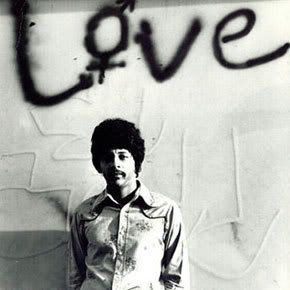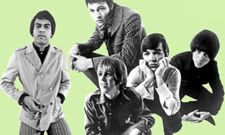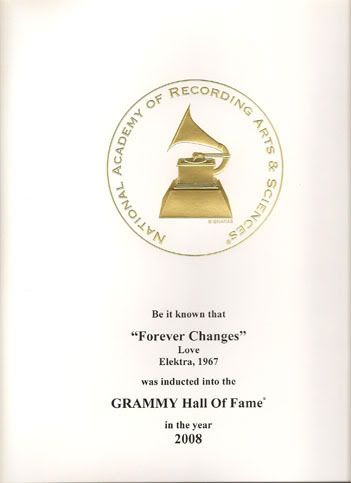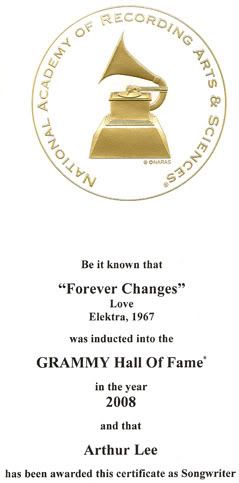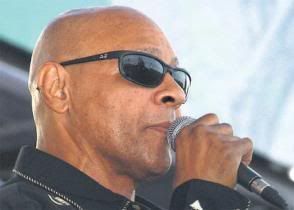
Backstage Pass: A conversation with Love's Arthur Lee, Part II
Goldmine writers
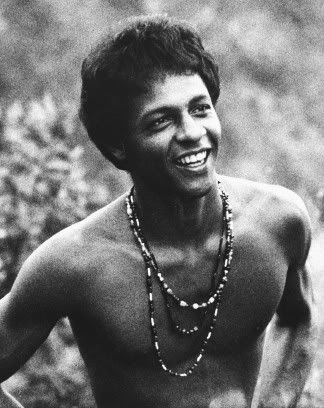
Love was psychedelic rock. R&B. Folk and blues. The band was at the forefront of the Sunset Strip ’60s, and singer-composer Arthur Lee was driving the train. He was friends with Jimi Hendrix and formed an interracial band before the guitarist ever entertained the notion. Love’s Forever Changes album rearranged everything — horns and strings and zigzag vocals.
At the time of this interview in 1975, Arthur Lee had disappeared himself for some three years. He was now back with a reformed Love and an album called Reel To Real. It is not Da Capo, nor is it even close to Forever Changes, but it is Love, and sometimes that’s all you need.
Do you remember where the name Love came from?
Arthur Lee: It was immediately after I heard that someone ripped my name off, The Grass Roots. There was a guy who was established, or whoever did it, he must have been established. He had the name copyrighted and all that, man.
I trusted people. I didn’t think anybody was gonna steal my name. It wasn’t my name, actually. But anyway, I think the reason I called the group Love was because rather than to hate somebody for stealing something from you, man, maybe you should love them. It would be a different approach to the whole trip. You dig it?
So, that’s how I got the name Love. I was riding on the freeway, trying to think of another name. “Well, Grass Roots is gone, call it Love?”
How did you meet up with Elektra?
AL: Elektra met up with me, man. Jac Holzman came to Bido Lido’s. He came with Herb Cohen, Mickey Cohen’s nephew. That was my first manager. He came to Bido Lido’s, man, and tried to pull a fast one.
They thought I was 26 or 27, and I signed a contract. If you sign a contract and you’re not 21 — I don’t know how the law goes today, and I didn’t yesterday either. And I sure ain’t gonna be thinking about it tomorrow (laughs)! But if you’re not 21, or you don’t have your parent’s consent or so-called judge’s consent, then f**k it, man, the contract is nowhere. So, I knew that, I knew that, man. I went ahead, and did that album with those people. I just thought up a name, Grass Roots Publishing; I lost the Grass Roots name for the group so stuck it on as the publishing company. It says Grass Roots Productions. And what happened was they found out that I wasn’t 21 when I signed that contract, man, so anything that I signed, anything didn’t matter. You dig?
So, Herb Cohen forged my name. And I had a handwriting expert under an attorney here in L.A., Al Schlesinger. “Yeah, this is legit.” I don’t see why I’d lie; it’s not important, but that’s what went down. What it was, as I said in the beginning of this particular bit, was I just thought you couldn’t have 100 percent of your publishing. I was 19, 20. I didn’t know, man.
But anyway, I gave this guy half the publishing, man. I wanted it back after I was 21 naturally, so what I had to do was buy it back. I paid five grand, got my publishing back from a guy who never had the publishing in the first place. If I could ever find that piece of paper, I got a lawsuit, you know? I’m going out and sue that motherf**ker, man!
No, that’s stupid. But, whatever.
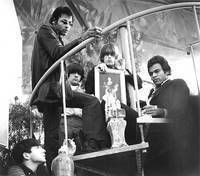
How long was Love together before you recorded the first album?
AL: Well, we were the Grass Roots, you know, like I told you, and then all was changed was just the name change, man. We were together about six months, eight months, something like that.
Was this all stuff that you had been playing in clubs?
AL: No. We were playing “Smokestack Lightning” and “Little Red Book” and things that other people wrote and did. But I hadn’t gotten into my own thing, so when I had a chance to do an album, of course, [I said] “First thing, I’m gonna do ‘Little Red Book’ and make sure it sells.” You know what I mean? And then I’ll throw all the rest of my shit on there, man, and maybe people will go for that, too. So, it was a chance, and it’s turned out pretty good as far as I’m concerned.
Were you surprised?
AL: Yeah. What I expected actually, man, was to retire after the first album. I went through so many changes with them dudes in the studio the first time around, man. I figured, “Yeah, I’ll go through these changes with these people, because I know this record is gonna do it for me. I’ll just kiss it goodbye and retire at 21 like I planned.” Well, I’m 29 now, and I ain’t retired, man. As a matter of fact, do you got a couple bucks at the moment (laughs)? Ten albums later, shit. Same old story. S-O-S, Same Old Shit.
There were 14 songs on the Love album, which was pretty remarkable at the time.
AL: There could have been 20, man, at least. It was the first album, man; I had written all these f**kin’ songs, gone around to all these f**kin’ record companies, and every time I got turned down or somethin’, every time I went through some so-called bummer, man, I try to write somethin’ good to overcome the bad feeling that I got. I wrote “Andmoreagain” like that for sure. Here I am, upstairs with a chick that I dig, and the next thing I know, Bryan’s f**king her downstairs (laughs). There’s “And more again” and more and more and more and more, again and again and again. F**k it; it’s cool.
So on the first album, you were just trying to put down all the different kinds of things you were going through and all the different music you had in your head? There are a lot of styles on there.
AL: Yeah, man, there are, there are. The musicians weren’t up to par in the studio, man. We played so much better live. I wanted to make sure I got my foot in the door, so I wrote all those songs, and we did those songs. But we didn’t do the songs that we were drawing all those f***ing people by as The Grass Roots, you dig?
Forever Changes is kind of a big jump from the second album.
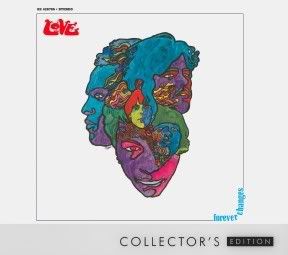
AL: To you. I can understand how you can say that and other people. To me, I’ve never had a big jump. I’ve never jumped big at all. I’m not meaning that I haven’t done a big thing or anything, but I mean the way you said that…
There were more instruments, and I think the songwriting itself had progressed.
AL: I had to try it out. I was feeling my way. Like from the first album, if they dig that then maybe I’ll get a chance to do another album.
Then, maybe I’ll get a chance to do my thing. My thing was the Forever Changes album. That’s when I finally got a chance to do my thing, and I wasn’t worried about whether the public was gonna buy it or whatever.
Forever Changes took a while to record.
AL: Yeah, it did. It took longer because the guys... they got headstrong or something. Neil Young came in, and he was supposed to produce the Forever Changes album. He had all these studio guys down in there, and I’m spending all this bread. And then my group would come down and check these guys out; then they’d go out to the studio.
The bass player would tell the studio bass player what to play. And I’d say, “Well, what the f**k? If you knew what to play, how come you didn’t do it?” Because we went in the studio and tried to do that song, and those dudes were somewhere else, man. So, after seeing my money go down the drain, those motherf**kers, then they got it together enough to do at least what they did on Forever Changes — which I think is still mixed wrong. The engineer at the time, Bruce Botnick and I, we were really at a poor understanding of who he thought he was and I knew I was him anyways (laughs). I knew he was me anyway.
Why not just produce it yourself?
AL: I produced Vindicator myself. But why not produce it myself at that time? Because I still didn’t understand… I didn’t know how far I could go. I started off singing and playing the accordion and all that stuff; I didn’t know how far. When it got into things like business, the organizations like publishers and producers and all of that, I didn’t know. I didn’t know if I could do that or not. That’s why I didn’t produce; I did produce it, though!
Was the band doing much touring during this period?
AL: We weren’t doing anything, but we were up and down the West Coast. What they wanted us to do was go and eat shit. I just wasn’t going for it, because I had my $50 a month pad; I was eating every day. And I just didn’t see why I had to go out on the road and eat shit. You know? Like The Doors came along right after us, and they went out and ate shit, and Elektra did everything for them. A little shit goes a long way.
If they had set up some good tours for you, would you have gone out?
AL: I went out. I went out, man. We did the best we could.
I mean if they had taken care of you more. You just seem bitter about going out on the road.
AL: I wasn’t bitter, man. I wasn’t. I just didn’t feel like going that’s all. It was either I was so young, it was either my hair wasn’t long enough or I didn’t have the right kind of pants on. Now, that’s how stupid the trip was. No shit.
Did you think going on the road might help you sell more albums?
AL: I always thought that if something was good, it would get through anyway — whether you went out on the road or not. There’s a guy now, Barry White — how many times has he been out on the road?
Next thing you know, he’s playing at the Hollywood Bowl! Now, I don’t know how many people came or what, but I know that the dude ain’t no work-at-the-Whiskey-six-months-and-then-go-to-the-Troubadour. But he’s selling; he’s got the #1 record now, and he’s doing all this shit now. That’s why I thought it was gonna happen for me.
For the Four Sail album, you got an entirely new band.
AL: On Four Sail, it was spelled F-O-U-R, but it was really like a For Sale sign in front of a house. I needed some bread. So the group was for sale. No shit.
You were fed up with them?
AL: Well, Elektra, yeah. I had done the last thing for Elektra, and they didn’t do me no justice as far as the way I look at it, man. Maybe they would have if I had applied myself better than I did, but I didn’t, and they didn’t. So f**k it. For sale! Love’s for sale, who wants to buy?
(Bob) Krasnow came along, Blue Thumb Records. He bought it. That’s cool, you know. I wanna tell you something right now, man. I ain’t never been on a record company that I didn’t try to do my best. A lot of people can say that this guy goes from record company to record company just for the front bread or whatever and jacks them up. That is bullshit, man. Anything that I do, I want to make sure that I do it the best that I can. It may not sound good sometimes to you or even to me, but man, I try to do my best.

